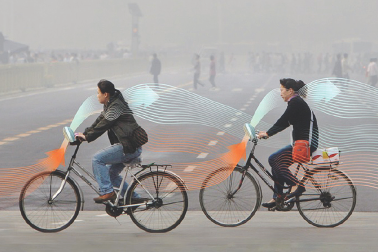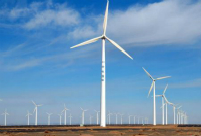


An artist's impression shows how a device mounted on the "smog free bike" could work. DAAN ROOSEGAARDE/CHINA DAILY
A Dutch designer has teamed up with Chinese bike-sharing company Ofo to develop a bicycle that filters pollution out of the air as it is ridden.
The "smog-free bikes" will first roll out in China, before they are made available in the United Kingdom and elsewhere in Europe.
Daan Roosegaarde, head of Rotterdam-based Studio Roosegaarde, is in China working on a prototype with engineers and designers from Ofo, Tongji University, and Chinese design platform Tezign. The team hopes to have a functioning model completed by the end of the year.
"The final goal is to have around 2.5 million 'smog-free bicycles' in a city like Beijing, to help reduce pollution between 5 and 15 percent in the coming two years," said Roosegaarde.
He has met with local authorities and developers in London regarding other clean-air projects, and said bringing the bikes to the UK and the Netherlands is part of the project's long-term plans.
Ofo, founded by 26-year-old Chinese entrepreneur Dai Wei, has rolled out its dockless bike-sharing system in Cambridge and is in talks with other British cities to make its bikes more widely available.
Roosegaarde said the aim is to have the Ofo bike fleet use air-cleaning technology similar to that used in the 7-meter "smog-free tower" that he made and toured the Netherlands and China with last year.
"Dai Wei is really keen on adding value to the bikes," Roosegaarde said. "They are looking at smart locks, communication with the user, air quality measurement devices on the bikes-innovation is moving them forward."
The bikes will be mounted with a device at the front that sucks in air, removing particulate matter through the ionization process. Impurities that are too small to be caught by conventional filters, including nanoparticles, are positively charged and attracted to a negatively charged surface. Clean air would be funneled out the back of the device toward the rider's face.
"Take a balloon and polish it with your hand to produce static-it's the same principle," Roosegaarde said. "This is the only way of cleaning large volumes in a safe, energy efficient, in-depth way. Filters don't catch the small particles and they use a lot of electricity. This kind of technology is already used indoors in places like hospitals-we are taking it outdoors."
Roosegaarde said such a device could be built for vehicles, however he hopes the project will encourage city-dwellers to switch their cars for bikes.
The team will also decide how best to dispose of or recycle the smog particles collected by the devices. Some of the particulate matter captured by the air-cleaning tower was used to make "smog jewelry", such as rings.
"The project is about the dream of clean air," Roosegaarde said. "We made the tower, and ideas grow. Our latest adventure is the bicycle and we are very happy to work with Ofo."
 Picturesque summer scenery of Tuohulasu Prairie in Xinjiang
Picturesque summer scenery of Tuohulasu Prairie in Xinjiang Colors of summer: Yanhu lake transforms into muti-colored pools
Colors of summer: Yanhu lake transforms into muti-colored pools China’s high-speed railway now offers food at the click of a button
China’s high-speed railway now offers food at the click of a button New uniform coming to PLA
New uniform coming to PLA Gambler or dreamer?
Gambler or dreamer? China is world’s largest renewable energy producer, consumer
China is world’s largest renewable energy producer, consumer Chinese base in Djibouti not military expansion
Chinese base in Djibouti not military expansion Legislation needed to protect China’s dark sky resources
Legislation needed to protect China’s dark sky resources China’s domestic airlines' carrying capacity beats the US
China’s domestic airlines' carrying capacity beats the US Top 10 most sustainable cities in China
Top 10 most sustainable cities in China Top 10 European patent applicants in 2016
Top 10 European patent applicants in 2016 The power of 'She' in China
The power of 'She' in China Seven most beautiful art museums in China
Seven most beautiful art museums in China Washington needs to take a fair look at Sino-US trade
Washington needs to take a fair look at Sino-US trade Fuxing high speed trains restore confidence in Chinese tech at home and abroad
Fuxing high speed trains restore confidence in Chinese tech at home and abroad  Warning against ‘irrational overseas investment’
Warning against ‘irrational overseas investment’  Betting on cashier-less retail
Betting on cashier-less retailDay|Week